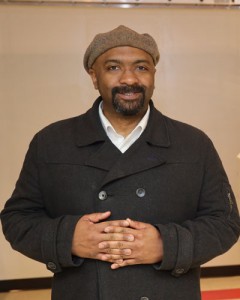People: Biomedical Imaging

Stuart Washington, PhD
Postdoctoral Fellow
(202) 865-4980
sdw4@georgetown.edu
Biography
Stuart D. Washington, PhD has been intensively involved in scientific research since graduating from Georgetown University with a PhD in Neuroscience in 2008. He performed single-unit in-vivo electrophysiology in the primary auditory (A1) cortices of awake mustached bats, a classical auditory model. Dr. Washington also studied resting-state networks in children with autism spectrum disorder and Ornithine Transcarbamylase Deficiency and executive control networks in veterans with Gulf War Illness (GWI) and patients with Chronic Fatigue Syndrome (CFS). He also created an MRI-based brain atlas of the mustached bat and generated fMRI-based evidence for spectral/temporal asymmetry for song perception in zebra finches. He is currently developing fMRI protocols at MIL with the aim of combining it with optogenetics to explore cerebellothalamocortical neural circuitry in mice.
Areas of Expertise
- fMRI Imaging and Analysis
- Electrophysiology
Selected Publications
- S.D. Washington, R.U. Rayhan, R. Garner, D. Provenzano, K. Zajur, F.M. Addiego, J.W. VanMeter, J.N. Baraniuk. Exercise alters brain activation in Gulf War Illness and Myalgic Encephalomyelitis/ Chronic Fatigue Syndrome. Brain Communications (2020). 2(2): fcaa070. doi: 10.1093/braincomms/fcaa070
- D. Provenzano, S.D. Washington, Y.J. Rao, M. Loew, J.N. Baraniuk. Machine learning detects pattern of differences in functional magnetic resonance imaging (fMRI) data between Chronic Fatigue Syndrome (CFS) and Gulf War Illness (GWI). Brain Sciences (2020) 10(7):456. doi: 10.3390/brainsci10070456
- S.D. Washington, R.U. Rayhan, R. Garner, D. Provensano, K. Zajur, F.M. Addiego, J.W. VanMeter, J.N. Baraniuk. Exercise alters brain activation in Gulf War Illness and Myalgic Encephalomyelitis/Chronic Fatigue Syndrome. Brain Communications (2020). 2(1): fcz039. doi: 10.1093/braincomms/fcz039
- D. Provenzano, S.D. Washington, Y.J. Rao, M. Loew, J.N. Baraniuk. Logistic regression algorithm differentiates Gulf War Illness (GWI) functional magnetic resonance imaging (fMRI) data from a sedentary control. Brain Sci., (2020) 10 (5): 1-18. doi: 10.3390/brainsci10050319
- D. Provenzano, S.D. Washington, and J.N. Baraniuk. A machine learning approach to the differentiation of functional magnetic resonance imaging data of Chronic Fatigue Syndrome (CFS) from a sedentary control. Front. Comput. Neurosci. (2020) 14(2). doi:10.3389/fncom.2020.00002
- S.D. Washington, R.U. Rayhan, R. Garner, D. Provensano, K. Zajur, F.M. Addiego, J.W. VanMeter, J.N. Baraniuk. Exercise alters cerebellar and cortical activity related to working memory in phenotypes of Gulf War Illness. Brain Communications (2020); 2(1) doi:10.1093/braincomms/fcz039
- T.C. Clarke, J.D. Jamieson, P. Malone, R.U. Rayhan, S. Washington, J.W. VanMeter, J.N. Baraniuk. Connectivity differences between Gulf War Illness (GWI) phenotypes during a test of attention. PLoS One (2019) 14(12): e0226481. doi: 10.1371/journal.pone.0226481.
- R.U. Rayhan, S.D. Washington, R. Garner, K. Zajur, F.M. Addiego, J.W. VanMeter, J.N. Baraniuk. Exercise challenge alters default mode network dynamics in Gulf War Illness. BMC Neuroscience (2019); 20(1) doi: 10.1186/s12868-019-0488-6
- S.D. Washington, J. Hamaide, B. Jeurissen, G. Van Steenkiste, T. Huysmans, J. Sijbers, S. Deleye, J.S. Kanwal, G. De Groof, S. Liang, J. Van Audekerke, J.J. Wenstrup, A. Van der Linden, S. Radtke-Schuller, M. Verhoye. A three-dimensional digital neurological atlas of the mustached bat (Pteronotus parnellii). Neuroimage (2018)
- L. Van Ruijssevelt*, S.D. Washington*, J. Hamaide, M. Verhoye, G. Keliris, A. Van der Linden. Bilateral song processing in the zebra finch auditory forebrain reflects asymmetric sensitivity to temporal and spectral features. Frontiers in Neuroscience (2017); 11:549. doi:10.3389/fnins.2017.00549 *Authors contributed equally
- I. Pacheco-Colón, S.D. Washington, C. Sprouse, G. Helman, A.L. Gropman, J.W. VanMeter. Reduced functional connectivity of default mode and set-maintenance networks in ornithine transcarbamylase deficiency. PLoS One (2015); 10(6):e0129595
- S.D. Washington, J.W. VanMeter. Anterior-posterior connectivity within the default mode network increases during maturation. International Journal of Medical and Biological Frontiers (2015); 21(2):207-218
- S.D. Washington, J.S. Tillinghast. Conjugating time and frequency: hemispheric specialization, acoustic uncertainty, and the mustached bat. Frontiers in Neuroscience (2015); 9:143.
- S.D. Washington, E.M. Gordon, J. Brar, S. Warburton, A.T. Sawyer, A. Wolfe, E.R. Mease-Ference, L. Girton, A. Hailu, J. Mbwana, W.D. Gaillard, M.L. Kalbfleisch, J.W. VanMeter. Dysmaturation of the default mode network in autism. Human Brain Mapping (2014); 35(4): 1284-1296. (Epub: Jan 2013)
- S.D. Washington, J.S. Kanwal. Sex-dependent hemispheric asymmetries for processing frequency-modulated sounds in the primary auditory cortex of the mustached bat. Journal of Neurophysiology (2012); 108(6): 1548-66.
- S.D. Washington, J.S. Kanwal. DSCF neurons within the primary auditory cortex of the mustached bat process frequency modulations present within social calls. Journal of Neurophysiology (2008); 100 (6): 3285-3304.
- J.L. Krichmar, S. Nasuto, R. Scorcioni, S.D. Washington, G.A. Ascoli. The effects of dendritic morphology on neuron electrophysiology of CA3 pyramidal cell elctrophysiology: a simulation study. Brain Research 941 (1-2) (2002) 11-28.
- S.D. Washington, G.A. Ascoli, J.L. Krichmar. A statistical analysis of dendritic morphology’s effect on neuron electrophysiology of CA3 pyramidal cells. Neurocomputing 32-33 (2000) 261-269.
Contact Info
Stuart Washington, PhD
Molecular Imaging Laboratory
Howard University Hospital
Cancer Center, Rm B-108
2041 Georgia Ave., NW
Washington, DC 20060
Email: sdw4@georgetown.edu
Tel: (202) 865-4980
Fax: (202) 865-3722
